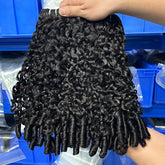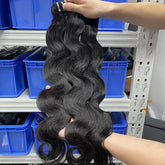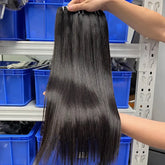Raw Hair vs Virgin Hair: Understanding the Difference
In the world of hair extensions and wigs, understanding the difference between Raw Hair and Virgin Hair is crucial for making informed decisions. Both terms are often used interchangeably, but they represent different aspects of hair quality. This guide will clarify the distinctions, helping hair industry professionals, stylists, and salon owners choose the best products for their clients.
1. Raw Hair: The Process-Oriented Choice
Raw Hair refers to hair that is sourced directly from donors and undergoes minimal processing. The focus here is on preserving the hair cuticle—the outermost layer of the hair shaft—which is essential for maintaining the hair's natural texture, strength, and longevity.
Key Characteristics of Raw Hair:
- Cuticle Preservation: The cuticles are intact and aligned in the same direction, reducing tangling and enhancing the hair's natural shine.
- Unprocessed Texture: Raw Hair retains its natural texture (straight, wavy, curly) without any chemical alterations.
- Minimal Processing: Raw Hair is not treated with chemicals, dyes, or heat, making it as close to its natural state as possible.
Quality Considerations:
Raw Hair is often considered the highest quality due to its unprocessed nature. Raw Hair may be either Virgin Hair or Remy Hair that has undergone cuticle preservation, so not all Raw Hair are Virgin Hair.
2. Virgin Hair: The Material-Oriented Choice
Virgin Hair emphasizes the quality of the hair material, which must be sourced from a single young donor and remain unprocessed. The term "Virgin Hair" refers to hair that has never been chemically treated, dyed, permed, or bleached.
Key Characteristics of Virgin Hair:
- Sourced from Young Donors: Virgin Hair is typically sourced from younger individuals, ensuring stronger, healthier strands.
- Single Donor: True Virgin Hair comes from one donor, ensuring uniformity in texture and color.
- Unprocessed: Virgin Hair usually has not undergone any chemical treatments, preserving its natural color and texture.
Quality Considerations:
Virgin Hair is prized for its purity and strength, but the term is often misused. True Virgin Hair should not have been chemically altered in any way, and it should be from a single donor. Virgin Hair can be processed to preserve the cuticle, making it overlap with Raw Hair in some cases.
3. The Overlap and Key Difference
It’s essential to understand that Virgin Hair can be Raw Hair, but not all Raw Hair is Virgin Hair. This distinction arises because:
- Virgin Hair is always unprocessed and cuticle-aligned, making it a subset of Raw Hair when sourced and handled correctly.
- Raw Hair includes both Virgin Hair and Remy Hair, with the key difference being that not all Raw Hair is sourced from a single young donor or remains unprocessed in the way Virgin Hair does.
4. Misconceptions About Virgin Hair
The term "Virgin Hair" is often misused in the industry, leading to confusion among consumers and professionals alike. It's crucial to ensure that what is labeled as Virgin Hair truly meets the criteria of being unprocessed and sourced from a single donor.
- Mislabeling: Some suppliers label minimally processed hair as Virgin Hair, which can lead to disappointment when the hair doesn't meet expectations.
- Mixed Donor Hair: True Virgin Hair should come from a single donor. Mixed donor hair, while still of high quality, does not offer the same consistency.
5. Why It Matters
Choosing between Raw Hair and Virgin Hair depends on the specific needs of your clients:
- Raw Hair: Ideal for those seeking the most natural, long-lasting hair that can be further processed or dyed.
- Virgin Hair: Best for clients wanting high-quality, unprocessed hair that retains its natural strength and texture.
Since the hair industry lacks unified standards, the best way to judge hair quality is by examining physical samples. By doing so, you can assess the cuticle preservation, texture, and overall condition, ensuring you provide the best products to your clients.
6. Our Commitment to Quality
At Yara Hair, all our products are made from genuine Raw Hair with preserved cuticles, our 15A raw single donor virgin hair is both Virgin and Raw. Our products are sourced ethically, with a focus on maintaining the hair's natural integrity. Whether you need Raw Hair with preserved cuticles or Virgin Hair that’s both pure and strong, we have you covered.
Conclusion
Understanding the difference between Raw Hair and Virgin Hair is vital for anyone in the hair industry. While they share similarities, the key distinctions lie in the processing methods and material sourcing. By staying informed and working with reputable suppliers, you can ensure that you offer your clients the best possible hair products, tailored to their specific needs.
For any further questions or to explore our range of Raw Hair and Virgin Hair products, don’t hesitate to contact us. We're here to help you make the best choice for your clients.







